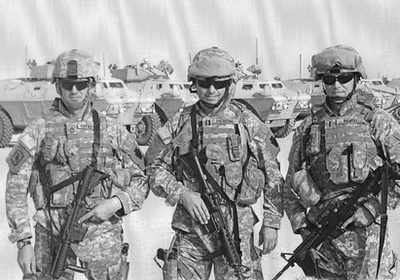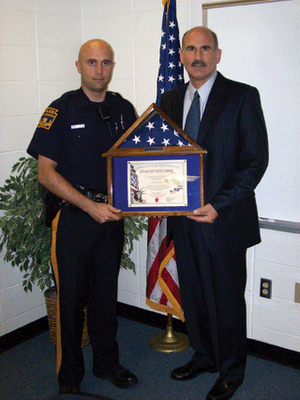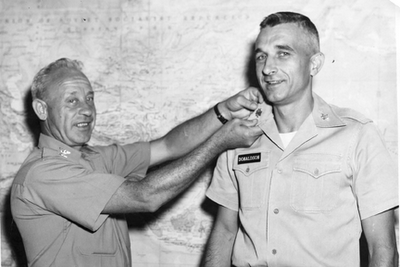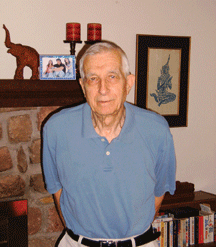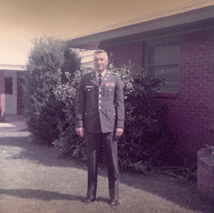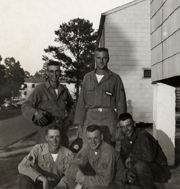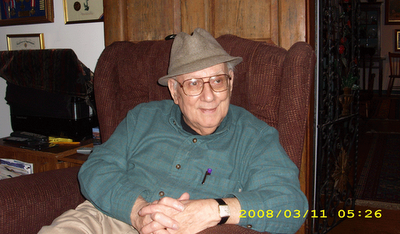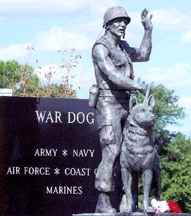Doug Reilly
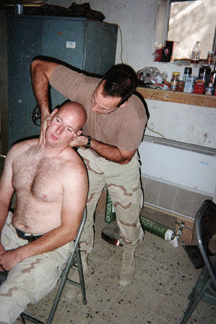
Chiropractor Dr. Doug Reilly adjusts a fellow soldier (above) during his time in Iraq.
Doug Reilly and his fellow soldiers pose (below) with a Philadelphia Eagles banner in Iraq.
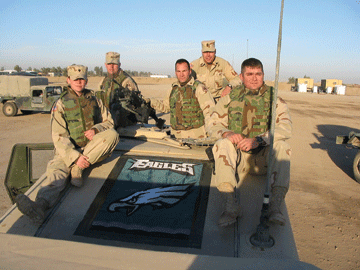
Bucks County chiropractor found his civilian job
was a great help to his fellow Army servicemen.
By Bob Staranowicz
Correspondent
“When one of my buddies serving with me in Iraq hurt his back, it was a very lucky day for me.”
Doug Reilly was serving in Iraq at a prison camp near Tallil when a fellow soldier hurt his back. Doug was not only bored but he was uncomfortable with his duties of “counting Iraqi dinar found on Iraqi prisoners, cataloguing their possessions and moving the prisoners throughout the country.”
So when his hurt friend came to him, Doug, who has a Chiropractic practice with his wife, Anne, in Plumsteadville, was very eager to help. He cured his buddy’s ailments.
This act of camaraderie resulted in Doug being able to use his talents in the war zone. His “patient” told his colonel about Doug’s talent and the colonel then allowed Doug to practice his chiropractic talents for up to two hours a day. This was an unusual opportunity since the Army did not formally recognize chiropractors. There have been some advances in that thinking by the military by way of the Chiropractic Health Care Demonstration Project. Doug feels that chiropractic care is vital to the combat readiness of our men and women serving our country.
For those soldiers who need chiropractic care, they must pay out of their own pockets.
Doug was born in Somerville, N.J., but currently resides in Plumsteadveille. He attended Palisades High School in Kintnersveille and went on to earn his undergraduate degree at Lock Haven University. He later attended Palmer School of Chiropractic in Davenport, Iowa.
Doug joined the Army in 1996.
“I joined the Army because it was my patriotic duty,” he said.
He also wanted to take advantage of the educational opportunities of serving in the military. Doug’s service was mostly as a reservist. Doug was on active duty for about a year and a half during the war, three of those months were pre-war, followed by a year in Iraq and three months in the states after leaving Iraq.
Doug’s main duty was “driving all over Iraq, transporting prisoners in buses and dump trucks” before the United States was fully engaged in Iraq.
“We were part of an advance party looking for a convoy,” he said. “We had to hitchhike from Kuwait to the Tallil Airbase.”
This was probably the most dangerous time for Doug while serving in Iraq.
“We did get shelled on a fairly regular basis while we were in Baghdad at the High Value detainee facility,” he said.
Similar to how most troops serving overseas feel, Doug missed his family and friends the most. But, as a doctor whose purpose is helping people, he missed his practice and his patients, as well.
Doug left the Army as a staff sergeant and was also awarded a Bronze Star for his service in Iraq. He would like to return to Iraq someday — “If my wife would let me,” he points out.
Doug returned to his practice, Reilly Family Chiropractic, upon his return to the U.S. and picked up right where he left off, with his love of family and involvement in sports and helping his patients. After all the horrific food in Iraq, he once again was able to enjoy a good meal. Doug continues to serve his patients as he served his country with purpose and the enjoyment of the accomplishment of helping those who need him.
Doug is also of member of Doylestown VFW Post 175 and is the current Commander of American Legion Post 210.
Labels: Army, Doylestown, Iraq
 RSS Feeds
RSS Feeds



